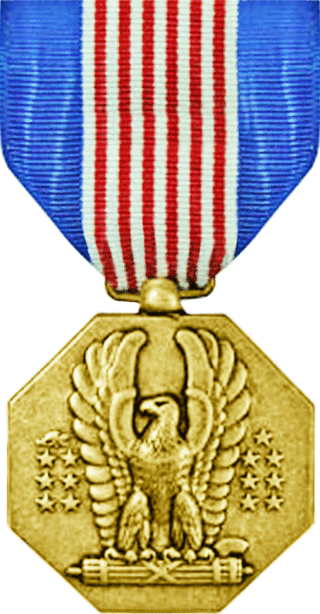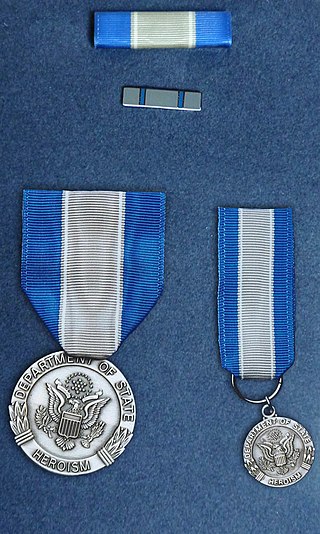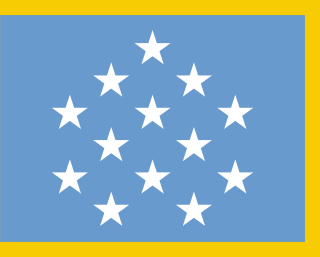
The Bronze Star Medal (BSM) is a United States Armed Forces decoration awarded to members of the United States Armed Forces for either heroic achievement, heroic service, meritorious achievement, or meritorious service in a combat zone.
The Commendation Medal is a mid-level United States military decoration presented for sustained acts of heroism or meritorious service. Each branch of the United States Armed Forces issues its own version of the Commendation Medal, with a fifth version existing for acts of joint military service performed under the Department of Defense.

Ryan Clark Crocker is a retired American diplomat who served as a career ambassador within the United States Foreign Service. A recipient of the Presidential Medal of Freedom, he served as United States ambassador to Afghanistan (2011–2012), Iraq (2007–2009), Pakistan (2004–2007), Syria (1998–2001), Kuwait (1994–1997), and Lebanon (1990–1993). In January 2010, he became dean of Texas A&M University's George Bush School of Government and Public Service.

The Navy and Marine Corps Medal is the highest non-combat decoration awarded for heroism by the United States Department of the Navy to members of the United States Navy and United States Marine Corps. The medal was established by an act of Congress on 7 August 1942, and is authorized under 10 U.S.C. § 6246.

The Soldier's Medal is an individual decoration of the United States Army. It was introduced as Section 11 of the Air Corps Act, passed by the Congress of the United States on July 2, 1926. The Soldier's Medal is equivalent to the Navy and Marine Corps Medal, the Air and Space Forces' Airman's Medal, and the Coast Guard Medal. Prior to the creation of the Airman's Medal in 1960, airmen were awarded the Soldier's Medal.

The Valorous Unit Award (VUA) is the second highest United States Army unit decoration which may be bestowed upon an Army unit after the Presidential Unit Citation (PUC). The VUA is awarded by the United States Army to units of the United States Armed Forces or cobelligerent nations which display extraordinary heroism in action against an armed enemy of the United States on or after 3 August 1963. The unit degree of heroism required is considered the equivalent of the individual degree of heroism required for the Silver Star which is awarded for gallantry in action.
A "V" device is a metal 1⁄4-inch (6.4 mm) capital letter "V" with serifs which, when worn on certain decorations awarded by the United States Armed Forces, distinguishes an award for heroism or valor in combat instead of for meritorious service or achievement.

United States law enforcement decorations are awarded by the police forces of the United States of America. Since the United States has a decentralized police force, with separate independent departments existing on the state and local level, there are thousands of law enforcement decorations in existence.
Awards and decorations of the United States Department of the Air Force are military decorations which are issued by the Department of the Air Force to airmen of the United States Air Force and guardians of the United States Space Force and members of other military branches serving under Air Force and Space Force commands.
Awards and decorations of the United States government are civilian awards of the U.S. federal government which are typically issued for sustained meritorious service, in a civilian capacity, while serving in the U.S. federal government. Certain U.S. government awards may also be issued to military personnel of the United States Armed Forces and be worn in conjunction with awards and decorations of the United States military. In order of precedence, those U.S. non-military awards and decorations authorized for wear are worn after U.S. military personal decorations and unit awards and before U.S. military campaign and service awards.
The United States Department of the Army offers a variety of awards, decorations and incentive programs to honor and recognize the contribution and efforts of its civilian workforce. Department of the Army civilian awards are governed by Army Regulation 672–20 Decorations, Awards, and Honors Incentive Awards.

Lowell Bruce Laingen was an American diplomat who served as the United States Ambassador to Malta from 1977 to 1979. Laingen is best known for having been the most senior American official held hostage during the Iran hostage crisis, while serving as the chargé d'affaires at the U.S. Embassy in Tehran.
The 9/11 Heroes Medal of Valor is a decoration in the United States, created specifically to honor the 442 public safety officers who were killed in the line of duty during the September 11, 2001 terrorist attacks at the World Trade Center and the empty wing of The Pentagon.
The United States Department of State, like other agencies of the U.S. federal government, gives civilian decorations for outstanding service, sacrifice, or heroism. The criteria for the awards are set down in 3 FAM 4820 - Foreign Affairs Manual, 3 FAM - Personnel, section 3 FAM 4800 Department Awards Program.

The Award for Heroism is an award of the United States Department of State. It is presented to employees of State, USAID and Marine guards assigned to diplomatic and consular facilities in recognition of acts of courage or outstanding performance under unusually difficult or dangerous circumstances, whether or not in connection with the performance of assigned duties.

The Superior Honor Award is an award of the United States Department of State. Similar versions of the same award exist for the former U.S. Information Agency, Arms Control and Disarmament Agency, and USAID. It is presented to groups or individuals in recognition of a special act or service or sustained extraordinary performance covering a period of one year or longer.

The Secretary of the Army Award for Valor was an award that acknowledged acts of heroism or bravery connected with a United States Army soldier or Army activity, or that in some way benefits the Army. The equivalent military decoration for this award is the Soldier's Medal.
The Vietnam Civilian Service Award is a discontinued award of the United States Foreign Service. It was presented to employees of the U.S. State Department, USAID and USIA assigned to diplomatic and consular facilities in Vietnam, or other civilian service in the airspace or territorial waters of Vietnam, greater than a year.

The Medal of Honor (MOH) is the United States Armed Forces' highest military decoration and is awarded to recognize American soldiers, sailors, marines, airmen, guardians and coast guardsmen who have distinguished themselves by acts of valor. The medal is normally awarded by the President of the United States and is presented "in the name of the United States Congress."










